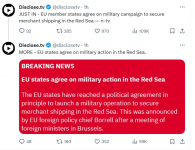You are using an out of date browser. It may not display this or other websites correctly.
You should upgrade or use an alternative browser.
You should upgrade or use an alternative browser.
INTL Joint statement from U.S., and more than 40 other countries, warning the Houthi against further attacks in the Red Sea Yemen Attacked Thurs. 1/11/24
- Thread starter jward
- Start date
jward
passin' thru
Tyler Rogoway
@Aviation_Intel
I can't vouch for the veracity of this report, but this was always much easier said than done.
From my piece on the complex reality of 'striking the Houthis' from December 17th, which is more relevant now than before, linked here: Why Hasn't The U.S. Struck Back After Red Sea Anti-Ship Attacks?
"Having the U.S. military strike targets in Yemen sounds easy, and it wouldn't be hard to do operationally, but the escalation that could follow could pose much more challenging tactical problems.
Giving the Houthis a 'bloody nose' is very different than actually stopping or even significantly curbing their ability to launch anti-ship attacks. Preempting anti-ship missile and drone attacks would require a large, costly, resource-sucking, open-ended operation. This would include persistent intelligence gathering across a very broad area, as well as strike assets at the ready to hit time-sensitive targets based on that real time intelligence.
Is the United States prepared to see that through and to what end?"
And from a more recent post about America's first strikes on Houthi targets in Yemen linked here: Red Sea Dangerous As Ever After Strikes, Shipping Industry Warns (Updated)
"Still, it must be highlighted that attempting to directly stop the Houthi missile and drone attacks on shipping in the Red Sea and Gulf of Aden militarily would be extremely resource intensive. While space-based infrared warning satellites would have detected the locations of anti-ship ballistic and most cruise missile launches — with many other intelligence capabilities gaining valuable information on these operations in recent weeks, as well — and documenting these patterns of operations would be critical to stopping launches before they occur, actually doing this would be a huge challenge. It would require a far more elaborate surveillance and reconnaissance enterprise to be persistently deployed over large swathes of Yemeni coastline and inland areas. This would need to be paired with assets at the ready capable of time-sensitive strikes. They would need to hit the launchers before firing.
Considering the Houthis have years of experience fighting against Saudi Arabia and their Arab coalition, they have dispersed their capabilities so they cannot be easily destroyed and know that firing from unpredictable locations and moving the weapons themselves around constantly is key to surviving. This makes eliminating them very challenging.
That being said, degrading the Houthis ability to target ships in other ways, like striking known radar systems and command and control nodes, could help reduce their ability to launch attacks but it will not eliminate it. Not even close."
View: https://twitter.com/Aviation_Intel/status/1748984700801364364?s=20
@Aviation_Intel
I can't vouch for the veracity of this report, but this was always much easier said than done.
From my piece on the complex reality of 'striking the Houthis' from December 17th, which is more relevant now than before, linked here: Why Hasn't The U.S. Struck Back After Red Sea Anti-Ship Attacks?
"Having the U.S. military strike targets in Yemen sounds easy, and it wouldn't be hard to do operationally, but the escalation that could follow could pose much more challenging tactical problems.
Giving the Houthis a 'bloody nose' is very different than actually stopping or even significantly curbing their ability to launch anti-ship attacks. Preempting anti-ship missile and drone attacks would require a large, costly, resource-sucking, open-ended operation. This would include persistent intelligence gathering across a very broad area, as well as strike assets at the ready to hit time-sensitive targets based on that real time intelligence.
Is the United States prepared to see that through and to what end?"
And from a more recent post about America's first strikes on Houthi targets in Yemen linked here: Red Sea Dangerous As Ever After Strikes, Shipping Industry Warns (Updated)
"Still, it must be highlighted that attempting to directly stop the Houthi missile and drone attacks on shipping in the Red Sea and Gulf of Aden militarily would be extremely resource intensive. While space-based infrared warning satellites would have detected the locations of anti-ship ballistic and most cruise missile launches — with many other intelligence capabilities gaining valuable information on these operations in recent weeks, as well — and documenting these patterns of operations would be critical to stopping launches before they occur, actually doing this would be a huge challenge. It would require a far more elaborate surveillance and reconnaissance enterprise to be persistently deployed over large swathes of Yemeni coastline and inland areas. This would need to be paired with assets at the ready capable of time-sensitive strikes. They would need to hit the launchers before firing.
Considering the Houthis have years of experience fighting against Saudi Arabia and their Arab coalition, they have dispersed their capabilities so they cannot be easily destroyed and know that firing from unpredictable locations and moving the weapons themselves around constantly is key to surviving. This makes eliminating them very challenging.
That being said, degrading the Houthis ability to target ships in other ways, like striking known radar systems and command and control nodes, could help reduce their ability to launch attacks but it will not eliminate it. Not even close."
View: https://twitter.com/Aviation_Intel/status/1748984700801364364?s=20
jward
passin' thru
Has Biden violated the US Constitution by bombing Yemen?
The United States launched military attacks on sites operated by the Iranian-backed Houthis in Yemen on Thursday, targeting its military infrastructure.
The US Air Force said in a statement that it had “executed deliberate strikes on over 60 targets at 16 Iranian-backed Houthi militant locations, including command and control nodes, munitions depots, launching systems, production facilities, and air defense radar systems”.
US President Joe Biden said the joint strikes with the United Kingdom were meant to demonstrate that the US and its allies “will not tolerate” the Houthis’ attacks on shipping in the Red Sea. The US raids, supported by Canada, Australia, Bahrain and the Netherlands, marked the first major US military response to Houthi attacks on shipping bound for Israel or owned by companies with any affiliations with Israel.
The threat posed by Houthi attacks on global shipping has become serious enough to cause major companies such as Maersk to suspend shipping in the Red Sea.
Several Democrat and Republican lawmakers have strongly criticised the move, accusing Biden of violating Article 1 of the US Constitution.
So what does Article 1 of the constitution say and has it been broken?
What is Article 1 of the US Constitution?
Article 1 of the US Constitution requires that war be authorised by Congress. In the lead-up to this week’s strikes on Yemen, Biden notified Congress of the strikes but did not seek authorisation. The article has long been understood to be a mechanism for checking and regulating the president’s power to wage war.The hotly debated Section 8 of Article 1 assigns Congress the authority to declare war, stating “The Congress shall have the power to … declare war.”
The precise section of the article that requires explicit congressional approval for military action is the third clause of Section 10, which states:
No State shall, without the Consent of Congress, lay any Duty of Tonnage, keep Troops, or Ships of War in time of Peace, enter into any Agreement or Compact with another State, or with a foreign Power, or engage in War, unless actually invaded, or in such imminent Danger as will not admit of delay.
What have US lawmakers said?
Congresswoman Pramila Jayapal from the Democratic Party called the strikes an “unacceptable violation of the Constitution” in an X post on Friday.Sign up for Al Jazeera
Week in the Middle East
Catch up on our coverage of the region, all in one place.
Jayapal’s statement was echoed by Democrat Congresswoman Cori Bush, who wrote: “The people do not want more of our taxpayer dollars going to endless war and the killing of civilians. Stop the bombing and do better by us.”This is an unacceptable violation of the Constitution. Article 1 requires that military action be authorized by Congress. https://t.co/rTo7HWFB54
— Rep. Pramila Jayapal (@RepJayapal) January 12, 2024
Other progressive lawmakers including Rashida Tlaib, Mark Pocan and Ro Khanna also took to the social media platform to denounce the military action as being in violation of Article 1..@POTUS can’t launch airstrikes in Yemen without congressional approval.
This is illegal and violates Article I of the Constitution.
The people do not want more of our taxpayer dollars going to endless war and the killing of civilians. Stop the bombing and do better by us. https://t.co/PFYYoknib6
— Congresswoman Cori Bush (@RepCori) January 12, 2024
However, it was not just Democrats who objected to Biden’s recent strikes. Republican Mike Lee shared Ro Khanna’s X post in agreement. “The Constitution matters, regardless of party affiliation,” he wrote.
Republican Texas Congressman Chip Roy wrote: “I am potentially fine with striking Yemen to defend critical shipping channel & response to aggression” but questioned the lack of congressional approval, asking: “Under what authority was this carried out?”I totally agree with @RoKhanna.
The Constitution matters, regardless of party affiliation. https://t.co/74ofiUw0Hb
— Mike Lee (@BasedMikeLee) January 12, 2024
Some Republicans, including Mitch McConnell, Joni Ernst, Roger Wicker, Rick Scott and Lindsey Graham voiced support for Biden’s decision, deeming the strikes overdue.I am potentially fine with striking Yemen to defend critical shipping channel & response to aggression, but why is Congress not making calls to strike a foreign country with pre-meditation? Under what authority was this carried out? Broad Art 2? Expansive view of existing AUMF?
— Chip Roy (@chiproytx) January 12, 2024
What do those in favour of the attacks say?
A joint statement released by the governments of Australia, Bahrain, Canada, Denmark, Germany, the Netherlands, New Zealand, the Republic of Korea, the UK and the US justified the strikes, saying they were conducted “in accordance with the inherent right of individual and collective self-defence, consistent with the UN Charter”.The Biden administration and its allies are likely to make another argument justifying the attacks by citing a section of the War Powers Act.
What is the War Powers Act?
The War Powers Resolution, more commonly known as the War Powers Act, was passed by the US Congress in November 1973.The Act requires the president to inform Congress within 48 hours of military action and requires the termination of military action within 60 days of its commencement if Congress has not officially declared war or authorised the military action.
In September 2023, the New York Times carried out a survey of presidential candidates. On this issue, Biden responded that if he was elected in 2024, he would seek congressional authorisation to start a major war but added he believed he has the power to “direct limited US military operations abroad without prior Congressional approval when those operations serve important US interests”.
This stands in contrast to Biden’s stance in 2007, when, during a Q&A with the Boston Globe, he said: “The Constitution is clear: except in response to an attack or the imminent threat of attack, only Congress may authorise war and the use of force.”
Have US presidents always sought congressional approval for military strikes?
No. There have been several instances when US presidents have carried out military strikes without seeking congressional approval.In December, the US military launched strikes against three sites used by Kataib Hezbollah, a major Iran-aligned armed group, and other unnamed affiliated groups in Iraq. Biden did not seek congressional approval beforehand.
The US president also ordered air strikes in Syria in February 2021 without the approval of Congress, a move that also drew criticism from lawmakers.
In January 2020, Democrats questioned whether it was legal for former president Donald Trump to order the assassination of the Iranian military commander, Qassem Soleimani, without congressional authorisation.
In March 2011, former president Barack Obama ordered air strikes in Libya without formal authorisation from Congress. Obama argued that the fighting in Libya did not amount to “hostilities” that would trigger the need for congressional approval.
Former president Bill Clinton escalated the 1999 NATO bombing against Serbia in Kosovo without formal authorisation from Congress.
Has Biden violated the US Constitution by bombing Yemen?
The heads up must be helpfulDefense sec. is still MIA as far as I know
S p r i n t e r
@Sprinter99800
Biden administration gives Pentagon go-ahead for large-scale military operation against Houthis in Yemen
jward
passin' thru
longwarjournal.org
The U.S. military continues to target Houthi anti-ship missiles that are poised to strike shipping in the Red Sea and the Bab Al Mandeb Strait. The attacks against Houthi missiles are no longer being conducted under the aegis of an international coalition, but directly by the U.S. military.
U.S. Central Command (CENTCOM) announced that it destroyed 18 Houthi anti-ship missiles as they were deployed on launch rails between Jan. 17 – 20. The Houthis launched two anti-ship ballistic missiles and one drone, which struck a merchant vessel, during the same timeframe (see timeline below).
The attacks on Houthi missiles are no longer being claimed by an international coalition, as the initial two strikes were. Both the U.S. and the United Kingdom launched the initial attack on Houthis military targets. A small number of other countries said they provided support for the initial strikes. All strikes since Jan. 13 have been claimed only by the U.S. military.
The U.S. government has continually issued contradictory statements that it seeks to restore deterrence, that it does not wish to escalate the fighting, and it is not “at war with the Houthis,” even as the Houthis have directly attacked U.S. warships and U.S. owned ships passing through the Red Sea. Instead, U.S. officials have said the strikes against Houthi military targets are in “self-defense”.
“We are not at war with the Houthis,” said Pentagon spokesperson Sabrina Singh on Jan. 18. “The Houthis are the ones that continue to launch cruise missiles, anti-ship missiles at innocent mariners…What we are doing, with our partners, is self-defense.”
The Houthis, with the support of Iran, are doing their part to defeat the U.S. and Israel as the latter battles Hamas and its terrorist allies in Gaza. Iran has assembled its Axis of Resistance, which includes the Yemen-based Houthis, Lebanese Hezbollah, the constellation of Iraqi and Syrian militias, and Hamas, Palestinian Islamic Jihad, and other Palestinian terror groups, to drive the U.S. from the Middle East and isolate and defeat Israel.
Timeline of U.S. and Houthi activities since Jan. 17:
Jan. 17: A Houthi drone (described by CENTCOM as a “one-way attack UAS,” or Unmanned Aircraft System, hit the Merchant Vessel Genco Picardy in the Gulf of Aden. No casualties were reported, however the ship was damaged.
Jan. 18: U.S. Central Command struck “14 Iran-backed Houthi missiles that were loaded to be fired in Houthi controlled areas in Yemen.” The Houthi missiles were “on launch rails” when they were hit.
Jan. 18: The Houthis “launched two anti-ship ballistic missiles” at the Merchant Vessel Chem Ranger. The missiles missed the vessel.
Jan. 19: U.S. Central Command attacked and destroyed “three Houthi anti-ship missiles that were aimed into the Southern Red Sea and were prepared to launch.”
Jan. 20: U.S. Central Command attacked a Houthi anti-ship missile that “was prepared to launch.”
Joe Truzman is a research analyst at FDD's Long War Journal focused primarily on Palestinian militant groups and Hezbollah. Bill Roggio is a Senior Fellow at the Foundation for Defense of Democracies and the Editor of FDD's Long War Journal.
Are you a dedicated reader of FDD's Long War Journal? Has our research benefitted you or your team over the years? Support our independent reporting and analysis today by considering a one-time or monthly donation. Thanks for reading! You can make a tax-deductible donation here.
Tags: Ansar Allah, Bab al Mandeb, houthis, Iran, Israel, Red Sea, Syria, U.S. Military, Yemen
U.S. targets Houthi anti-ship missiles in “self-defense” strikes | FDD's Long War Journal
U.S. targets Houthi anti-ship missiles in “self-defense” strikes | FDD's Long War Journal
Joe Truzman & Bill Roggio
The U.S. military continues to target Houthi anti-ship missiles that are poised to strike shipping in the Red Sea and the Bab Al Mandeb Strait. The attacks against Houthi missiles are no longer being conducted under the aegis of an international coalition, but directly by the U.S. military.
U.S. Central Command (CENTCOM) announced that it destroyed 18 Houthi anti-ship missiles as they were deployed on launch rails between Jan. 17 – 20. The Houthis launched two anti-ship ballistic missiles and one drone, which struck a merchant vessel, during the same timeframe (see timeline below).
The attacks on Houthi missiles are no longer being claimed by an international coalition, as the initial two strikes were. Both the U.S. and the United Kingdom launched the initial attack on Houthis military targets. A small number of other countries said they provided support for the initial strikes. All strikes since Jan. 13 have been claimed only by the U.S. military.
The U.S. government has continually issued contradictory statements that it seeks to restore deterrence, that it does not wish to escalate the fighting, and it is not “at war with the Houthis,” even as the Houthis have directly attacked U.S. warships and U.S. owned ships passing through the Red Sea. Instead, U.S. officials have said the strikes against Houthi military targets are in “self-defense”.
“We are not at war with the Houthis,” said Pentagon spokesperson Sabrina Singh on Jan. 18. “The Houthis are the ones that continue to launch cruise missiles, anti-ship missiles at innocent mariners…What we are doing, with our partners, is self-defense.”
The Houthis, with the support of Iran, are doing their part to defeat the U.S. and Israel as the latter battles Hamas and its terrorist allies in Gaza. Iran has assembled its Axis of Resistance, which includes the Yemen-based Houthis, Lebanese Hezbollah, the constellation of Iraqi and Syrian militias, and Hamas, Palestinian Islamic Jihad, and other Palestinian terror groups, to drive the U.S. from the Middle East and isolate and defeat Israel.
Timeline of U.S. and Houthi activities since Jan. 17:
Jan. 17: A Houthi drone (described by CENTCOM as a “one-way attack UAS,” or Unmanned Aircraft System, hit the Merchant Vessel Genco Picardy in the Gulf of Aden. No casualties were reported, however the ship was damaged.
Jan. 18: U.S. Central Command struck “14 Iran-backed Houthi missiles that were loaded to be fired in Houthi controlled areas in Yemen.” The Houthi missiles were “on launch rails” when they were hit.
Jan. 18: The Houthis “launched two anti-ship ballistic missiles” at the Merchant Vessel Chem Ranger. The missiles missed the vessel.
Jan. 19: U.S. Central Command attacked and destroyed “three Houthi anti-ship missiles that were aimed into the Southern Red Sea and were prepared to launch.”
Jan. 20: U.S. Central Command attacked a Houthi anti-ship missile that “was prepared to launch.”
Joe Truzman is a research analyst at FDD's Long War Journal focused primarily on Palestinian militant groups and Hezbollah. Bill Roggio is a Senior Fellow at the Foundation for Defense of Democracies and the Editor of FDD's Long War Journal.
Are you a dedicated reader of FDD's Long War Journal? Has our research benefitted you or your team over the years? Support our independent reporting and analysis today by considering a one-time or monthly donation. Thanks for reading! You can make a tax-deductible donation here.
Tags: Ansar Allah, Bab al Mandeb, houthis, Iran, Israel, Red Sea, Syria, U.S. Military, Yemen
U.S. targets Houthi anti-ship missiles in “self-defense” strikes | FDD's Long War Journal
northern watch
TB Fanatic
danielboon
TB Fanatic
EndGameWW3 reposted

OSINTdefender
@sentdefender
·
17m
The Houthi Terrorist Group in Yemen is claiming to have Attacked the American-Flagged and Owned Cargo Ship, M/V OCEAN JAZZ today as it Transited the Southern Red Sea; so far there has been no Confirmation of this by U.S. Officials.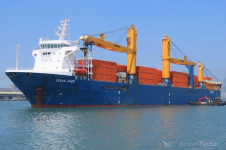

OSINTdefender
@sentdefender
·
17m
The Houthi Terrorist Group in Yemen is claiming to have Attacked the American-Flagged and Owned Cargo Ship, M/V OCEAN JAZZ today as it Transited the Southern Red Sea; so far there has been no Confirmation of this by U.S. Officials.

danielboon
TB Fanatic
EndGameWW3
@EndGameWW3
·
1h
An important statement by the Yemeni Armed Forces at exactly eight o’clock in the evening, Sana’a capital time. About an hour from now...
@EndGameWW3
·
1h
An important statement by the Yemeni Armed Forces at exactly eight o’clock in the evening, Sana’a capital time. About an hour from now...
danielboon
TB Fanatic
EndGameWW3
@EndGameWW3
·
2h
The US Defense: Houthi attacks in the Red Sea increase the risk of a regional war breaking out, and the situation is currently very dangerous.
@EndGameWW3
·
2h
The US Defense: Houthi attacks in the Red Sea increase the risk of a regional war breaking out, and the situation is currently very dangerous.
danielboon
TB Fanatic
EndGameWW3 reposted

OSINTdefender
@sentdefender
·
17m
The Houthi Terrorist Group in Yemen is claiming to have Attacked the American-Flagged and Owned Cargo Ship, M/V OCEAN JAZZ today as it Transited the Southern Red Sea; so far there has been no Confirmation of this by U.S. Officials. View attachment 457048
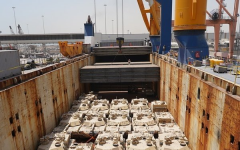
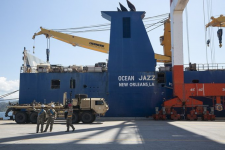
danielboon
TB Fanatic
Ocean Jazz
The heavy-lift vessel Ocean Jazz arrives at port in Gladstone, Australia, June 26, 2017, to offload military equipment that will be used in exercise Talisman Saber 2017. The Ocean Jazz is under a Military Sealift Command contract to support U.S. Army Pacific’s transportation requirements. Navy photo by Grady T. Fontana Ocean JazzSouthernBreeze
Has No Life - Lives on TB
Ocean Jazz
The heavy-lift vessel Ocean Jazz arrives at port in Gladstone, Australia, June 26, 2017, to offload military equipment that will be used in exercise Talisman Saber 2017. The Ocean Jazz is under a Military Sealift Command contract to support U.S. Army Pacific’s transportation requirements. Navy photo by Grady T. Fontana Ocean Jazz
I thought that looked like military equipment in the photo.
somewherepress
Has No Life - Lives on TB
Ocean Jazz
The heavy-lift vessel Ocean Jazz arrives at port in Gladstone, Australia, June 26, 2017, to offload military equipment that will be used in exercise Talisman Saber 2017. The Ocean Jazz is under a Military Sealift Command contract to support U.S. Army Pacific’s transportation requirements. Navy photo by Grady T. Fontana Ocean Jazz

John Ʌ Konrad V
@johnkonrad
The Ocean Jazz is not just a “U.S. owned” ship like some of the recent targets It’s a us owned & flagged ship that is manned by US Merchant Mariners & routinely carries oversized US military equipment for
@US_TRANSCOM
Here she’s delivering Black Hawk helicopters in 2018
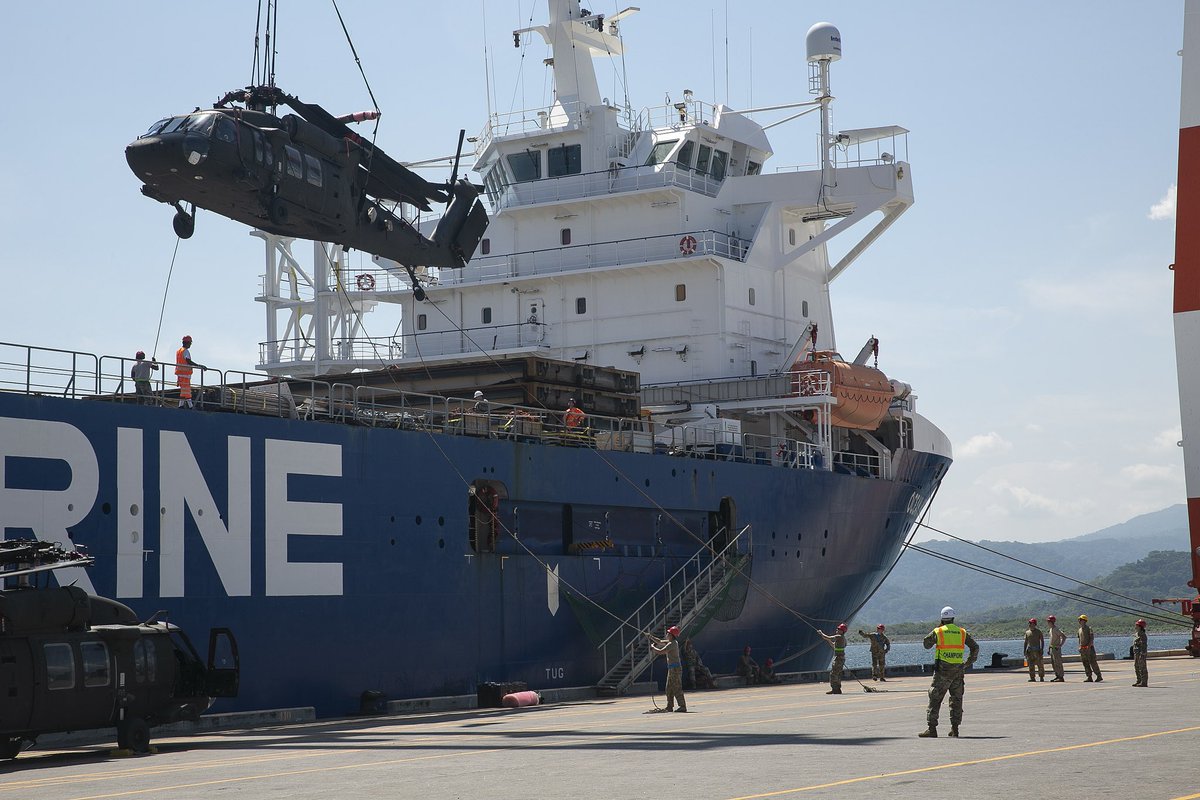
Quote

First Squawk
@FirstSquawk
·
1h
YEMEN'S HOUTHI MILITARY SPOKESMAN: NAVAL FORCES CARRIED OUT MILITARY OPERATION TARGETING AMERICAN MILITARY CARGO SHIP (OCEAN JAZZ) IN THE GULF OF ADEN
Last edited11:38 AM · Jan 22, 2024
somewherepress
Has No Life - Lives on TB

John Ʌ Konrad V
@johnkonrad
Ocean Jazz in 2021 loaded tanks are other vehicles and equipment from the 2nd Armored Brigade Combat Team, 1st Armored Division
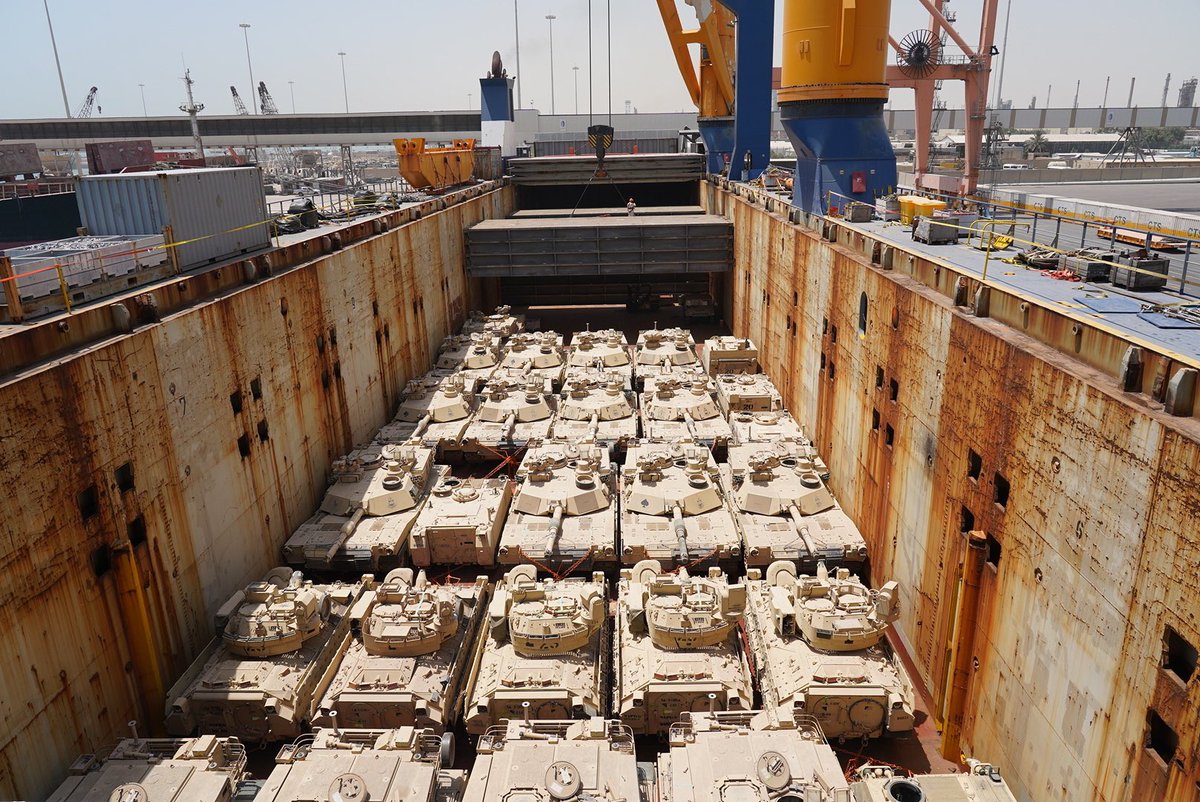
11:40 AM · Jan 22, 2024 from Massachusetts, USA
northern watch
TB Fanatic
jward
passin' thru
Mario Nawfal
@MarioNawfal
BREAKING: EU TO JOIN U.S. IN RED SEA
The European Union has reportedly reached an agreement "in principle" to launch a military operation to secure merchant shipping in the Red Sea.
Josep Borrell, the EU's Foreign Policy Chief: "Irresponsible Houthi actions are a threat to freedom of navigation in the Red Sea."
This comes as the U.S. continues to carry out joint sea and land operations to protect shipping lanes, deter attacks, and stop weapon supplies to the Houthis.
Source: Faytuks News, X
View: https://twitter.com/MarioNawfal/status/1749501441847234643?s=20
@MarioNawfal
BREAKING: EU TO JOIN U.S. IN RED SEA
The European Union has reportedly reached an agreement "in principle" to launch a military operation to secure merchant shipping in the Red Sea.
Josep Borrell, the EU's Foreign Policy Chief: "Irresponsible Houthi actions are a threat to freedom of navigation in the Red Sea."
This comes as the U.S. continues to carry out joint sea and land operations to protect shipping lanes, deter attacks, and stop weapon supplies to the Houthis.
Source: Faytuks News, X
View: https://twitter.com/MarioNawfal/status/1749501441847234643?s=20
jward
passin' thru
S p r i n t e r
@Sprinter99800
Yemeni Armed Forces Statement : The Yemeni Army Navy, with the help of the Almighty, attacked an American military cargo ship (OCEAN JAZZ) in the Gulf of Aden using appropriate missiles.
The Yemeni Armed Forces confirm that a response to the US and UK attacks is inevitable and any new attack will not go unpunished
@Sprinter99800
Yemeni Armed Forces Statement : The Yemeni Army Navy, with the help of the Almighty, attacked an American military cargo ship (OCEAN JAZZ) in the Gulf of Aden using appropriate missiles.
The Yemeni Armed Forces confirm that a response to the US and UK attacks is inevitable and any new attack will not go unpunished
jward
passin' thru
H I Sutton
@CovertShores
***UPDATE***
9 Lessons From Iranian And Houthi Attacks On Ships In The Red Sea
Attacks on merchant ships and warships in the Red Sea and surrounding waters are ongoing. Most of the attacks have been by the Houthi Movement in Yemen, but some can be attributed directly to Iran. And there is no reasonable doubt that Iran is assisting the Houthis. So far no ship has been sunk, although several have been hit and the impact on global shipping has been substantial. It is too soon to draw conclusive lessons, but some observations can be made.
In the past couple of years has seen a profusion of these designs, all appearing to leverage the same seeker. The largest and likely most sophisticated is the Raad-500 type which the Houthis call Tankil, while the Bahr al-Ahmar is barely wider than the seeker. Range and warhead vary but all present a real threat. The smaller ones will likely be cheaper and easier to hide, but still have adequate range of the engagements in the Red Sea.
Their usefulness against warships is likely to be very limited but against unarmed merchant ships they are a real concern. Various OWA-UAVs are being used by the Houthis against ships. Many miss or get shot down, but they are likely to get better.
This also implies that if the Houthis hit a Russian or Chinese ship in the Red Sea, they meant to do so.
Warships are however smaller and have more critical parts in close proximity. As a trade off, they are expected to have better defenses and damage control should the worst happen.
Even today few warships have defenses against ASBMs. For many navies the implementation of this capability is progressing much slower than the threat is proliferating.
Warships also need to intercept missiles aimed at other ships. This stretches engagement envelopes and magazines.
The latest strikes, which target missiles before they can be launched, are probably more useful. But they cannot be expected to catch every launch, and the Houthis can modify their methods to reduce the risks. For example, launching ASBMs from deep inland.
So far, no ships have been sunk. Possibly this is because they are trying not to. There are at least indications of weapons and tactics designed to reduce the risk of sinking the targeted ship. This suggests that their goals are being met merely by presenting a credible threat.
It seems likely that they may try to sink warships however. And the Iranian technology is, in principle, able to achieve it.
There are still several capabilities that Iran is believed to have, but which haven’t been used. And Iran and the Houthis can become more effective at these strikes if they learn from them. And there’s every indication that they will. This conflict appears far from over, and the next surprise could be as soon as tomorrow.
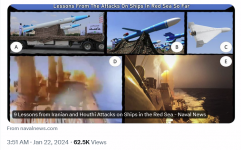
@CovertShores
***UPDATE***
9 Lessons From Iranian And Houthi Attacks On Ships In The Red Sea
Attacks on merchant ships and warships in the Red Sea and surrounding waters are ongoing. Most of the attacks have been by the Houthi Movement in Yemen, but some can be attributed directly to Iran. And there is no reasonable doubt that Iran is assisting the Houthis. So far no ship has been sunk, although several have been hit and the impact on global shipping has been substantial. It is too soon to draw conclusive lessons, but some observations can be made.
1. Modular anti-ship ballistic missiles
Iran developed an anti-ship version of their Fatah-110 ballistic missile over 10 years ago. This involved fitting an electro-optical /infrared seeker. The missiles are smaller, slower and shorter ranged than their Chinese equivalents, but still potent.In the past couple of years has seen a profusion of these designs, all appearing to leverage the same seeker. The largest and likely most sophisticated is the Raad-500 type which the Houthis call Tankil, while the Bahr al-Ahmar is barely wider than the seeker. Range and warhead vary but all present a real threat. The smaller ones will likely be cheaper and easier to hide, but still have adequate range of the engagements in the Red Sea.
2. Low cost simplified cruise missiles
Iran was able to reverse the Russian Kh-55 (AS-15 KENT) air launched cruise missile. Following this a simplified and scaled down version was built which could use a commercial turbojet engine similar to those in model aircraft. This design was supplied to the Houthis and may also now be in Iranian inventories. Essentially it gives the Houthis a very low cost long ranged land attack capability, but with a smaller warhead. And as to be expected in the Houthi arsenal, there is an anti-ship version. This approach is different from Western countries which tend to buy very few, yet expensive, cruise missiles.3. Use of drones against ships
The Shahed one-way attack drone (OWA-UAV) has shown its usefulness in Ukraine. Individually they are relatively easy to shoot down, yet they are too dangerous to ignore so they stretch defenses. Generally they have been perceived as only being useful against fixed targets. But Iran has demonstrated that they can also hit ships at incredible ranges. At least two ships have been hit, one at extreme range.Their usefulness against warships is likely to be very limited but against unarmed merchant ships they are a real concern. Various OWA-UAVs are being used by the Houthis against ships. Many miss or get shot down, but they are likely to get better.
4. Even ‘dark ships’ can be seen
Ships which do not transmit their location on AIS (automated identification system) are harder to locate and identify. This is particularly true for people relying on open-source intelligence (OSINT). But the effectiveness of ‘going dark’ against a determined adversary with eyes on the water, and various sophisticated means, is limited. Ships cannot easily hide their presence in the shipping lanes.This also implies that if the Houthis hit a Russian or Chinese ship in the Red Sea, they meant to do so.
5. Merchant ships are highly survivable, and missiles rarely sink ships
Modern merchant ships are built with survivability in mind. Perhaps not against these threats, but certainly in a way which makes them hard to sink. And their layout, with the superstructure well aft of their center of mass (where missiles typically aim), means most hits are where the cargo is. There is still a significant risk if they are hit by missiles, but in practice few if any will be sunk.Warships are however smaller and have more critical parts in close proximity. As a trade off, they are expected to have better defenses and damage control should the worst happen.
6. The importance of Air Defense for naval vessels
Warships are threatened by sustained multi-vector attacks with drones, sea skimming missiles and ASBMs. Many, maybe most, warships are too lightly defended to operate in this threat environment.Even today few warships have defenses against ASBMs. For many navies the implementation of this capability is progressing much slower than the threat is proliferating.
Warships also need to intercept missiles aimed at other ships. This stretches engagement envelopes and magazines.
7. Deterrence is of limited use against an antagonist with little to lose
When the attacks begun there were calls for Western countries to take military action against the Houthis. Many observers expected Tomahawks at dawn, and were frustrated when strikes took months to materialize. But many observers were unsure that strikes would make much difference. And as we have seen, the attacks continue.The latest strikes, which target missiles before they can be launched, are probably more useful. But they cannot be expected to catch every launch, and the Houthis can modify their methods to reduce the risks. For example, launching ASBMs from deep inland.
8. Don’t Underestimate Iranian Technology
Iran is capable of innovation, and of developing effective and smart weapons, particularly in the asymmetric arena. Credit where credit is due. There are some serious threats hidden behind the hype and grandiose claims.So far, no ships have been sunk. Possibly this is because they are trying not to. There are at least indications of weapons and tactics designed to reduce the risk of sinking the targeted ship. This suggests that their goals are being met merely by presenting a credible threat.
It seems likely that they may try to sink warships however. And the Iranian technology is, in principle, able to achieve it.
9. It is hard to predict the future
Few would have imagined that the first use of ASBMs would be by the Houthi Movement in the Red Sea.There are still several capabilities that Iran is believed to have, but which haven’t been used. And Iran and the Houthis can become more effective at these strikes if they learn from them. And there’s every indication that they will. This conflict appears far from over, and the next surprise could be as soon as tomorrow.

jward
passin' thru

Intelschizo and VivaRevolt liked
Liz Friden
@Liz_Friden
U.S. defense officials tell Fox News reports the U.S. flagged cargo ship Ocean Jazz was targeted by Houthi's in the Gulf of Aden is not true. One of the officials dismissed this as Houthi propaganda and said the U.S. military is not seeing or tracking any attacks at this time.
12:27 PM · Jan 22, 2024
34.9K
Views
You just know the captains were chosen based on attributes of the other category.
Just wait until a Biden diversity promotion runs one of our aircraft carriers onto a beach. We can blame it on bad pronouns…
somewherepress
Has No Life - Lives on TB
View: https://twitter.com/Sprinter99800/status/1749557864350286019
S p r i n t e r
@Sprinter99800
More than 15 air strikes by hostile American-British aircraft targeted the Yemeni capital, Sana’a, and the governorates of Taiz and Al-Bayda. Two US-British airstrikes targeted area northeast of the capital, Sana'a A raid targeted the Al-Barh area in the Maqbanah District in Taiz Governorate A raid targeted the Radaa area in Al-Bayda Governorate.
4:21 PM · Jan 22, 2024
S p r i n t e r
@Sprinter99800
More than 15 air strikes by hostile American-British aircraft targeted the Yemeni capital, Sana’a, and the governorates of Taiz and Al-Bayda. Two US-British airstrikes targeted area northeast of the capital, Sana'a A raid targeted the Al-Barh area in the Maqbanah District in Taiz Governorate A raid targeted the Radaa area in Al-Bayda Governorate.
4:21 PM · Jan 22, 2024
somewherepress
Has No Life - Lives on TB
S p r i n t e r
@Sprinter99800
A joint statement from the United States, Britain, Bahrain and other countries: Today’s strike in Yemen specifically targeted an underground storage site
4:40 PM · Jan 22, 2024
@Sprinter99800
A joint statement from the United States, Britain, Bahrain and other countries: Today’s strike in Yemen specifically targeted an underground storage site
4:40 PM · Jan 22, 2024
jward
passin' thru
Why US strikes won’t stop the Houthis
Sarah G Phillips
As the Houthi militant group in Yemen ramps up its attacks on vessels in the Red Sea – ostensibly in response to what it calls Israel’s “genocidal crimes” in Gaza – the US and UK have responded with multiple military strikes in the last week. The US has also re-listed the group as a global terrorist organization.
The hope is these strikes will pressure the Iran-aligned Houthis to back down. It won’t, however. Short of a complete halt to Israel’s war in Gaza and a 180-degree shift in Western support for Israel’s approach, there is little that will dissuade the Houthis to change course in the foreseeable future.
There are three main reasons for this, none of which are principally about Iran’s regional strategy.
The first, and most obvious, reason is the Houthi movement, whose political wing is known as Ansar Allah, has already withstood years of airstrikes in its war with a Saudi-led and Western-backed coalition from 2015–2022.
Prior to this, the Houthis fought six wars against the central Yemeni government from 2004–2010. Guerrilla warfare is not new to them, and harassing ships off their coast does not require sophisticated weapons.
The blockade that accompanied much of the recent war (which is currently in a shaky truce) also helped the Houthis to finetune their weapon smuggling networks from Iran, as well as their own domestic weapon production.
As a result, airstrikes alone are unlikely to deliver a knockout blow to their military capacity and will almost certainly increase their appetite for a fight.
That is because they can – for the first time – more strongly frame their actions in the context of fighting against the US and Israel, per their slogan: “God is Great, death to America, death to Israel, a curse upon the Jews, victory to Islam.”
Houthis have ‘quasi-legitimacy’
The second reason they are unlikely to be deterred is more important, but less understood because it is about Yemen’s domestic politics.The Houthis currently control much of Yemen, including the capital Sana’a, which accounts for around 70% of the population. The people in these regions have been subjected to years of acute and structural violence by the Houthis. This includes:
- the forced disappearances of political opponents and religious minorities
- the extrajudicial killings of journalists and executions of civilians, including minors
- the recruitment of child soldiers
- withholding public sector salaries since 2016
- the laying of landmines in populated areas, sniper attacks on civilians and the use of siege warfare
- the systematic extortion of businesses and implementation of a caste-based taxation system
- the implementation of male guardianship rules for women
- and the weaponization of food and water, including the diversion of food aid for private enrichment.

It is important to note the Saudi-led coalition and internationally recognized Yemeni government have also been accused of committing war crimes and grave human rights violations in Yemen, including the ruthless bombardment of civilians and civilian infrastructure.
At least 150,000 people are estimated to have died violently in the war that began in 2015, though the challenges with collecting such data are considerable. This also does not include the many more thousands that have died from preventable starvation and disease.
The behavior of the Houthis in power has made them deeply unpopular. Dissent is dangerous due to the sophisticated system of repression and neighborhood surveillance the Houthis have imposed in the areas they control. But Yemenis began taking to the streets in protest last year anyway in Ibb and the besieged city of Ta’izz.
Then on September 26, just before Hamas’ assault on southern Israel and Israel’s bombardment of Gaza, Yemenis defied the authorities in large numbers.
In protests in the capital city of Sana’a, they celebrated the anniversary of the 1962 revolution that ousted the country’s leader, the Zaydi Imam, Mohammed al-Badr – and with him, the kinship-based autocracy that many Yemenis claim the Houthis seek to reinstate.
Seeing this (rightly) as a demonstration against them, the Houthis were shaken. Amnesty International reported they responded with an “alarming wave of arrests” and “a draconian show of force.”
Against a background of rising dissent at home, the Houthis’ actions and Western retaliation have given the group the gift of “quasi-legitimacy,” according to Yemeni analysts. The US-led strikes also give credence to the Houthis’ demands that critics “shut their mouths.”
And just as important, the US strikes can boost the Houthis’ military recruitment efforts. And this could help them attempt to seize the government-held oil wells in Marib again, which the group needs to become economically sustainable.
Anger rising against the West
The third reason the Houthis are unlikely to be deterred by airstrikes or a terrorist designation is that their actions articulate the wider region’s fury at Israel’s war in Gaza, which has so far claimed the lives of 25,000 Palestinians, and the decades of Western support for Israel’s policies in occupied Gaza and the West Bank.They have also tapped into profound grievances about the West’s policies more generally and its record of reinforcing unpopular regimes in the face of popular action for change. This includes the selling of weapons and bestowing of political legitimacy to authoritarian regimes in exchange for what the West considers “stability” in the world order.
Yemenis are, however, keenly aware that the Houthis’ rise and expansion were enabled by this same external push for stability, which came at the expense of Yemenis’ ability to determine local solutions to local problems.
By centering the defense of Palestinians in their actions, the Houthis have found a way to discredit their domestic opponents – something that has largely eluded them for 20 years. This will make them even harder to dislodge from power and will likely consign ordinary Yemenis to further violence at their hands.
Sarah G Phillips is Professor of Global Conflict and Development at The University of Sydney and Non-Resident Fellow at the Sana’a Center for Strategic Studies, University of Sydney
This article is republished from The Conversation under a Creative Commons license. Read the original article.
Why US strikes won't stop the Houthis - Asia Times
jward
passin' thru
Sky News
@SkyNews
BREAKING: UK and US aid workers have been asked to leave Yemen.
A letter, seen by Sky News, from the Houthi-controlled Foreign Affairs Ministry to the country's UN coordinator requests that aid workers with US and British citizenship leave within 30 days

 trib.al
View: https://twitter.com/SkyNews/status/1749860062149963778?s=20
trib.al
View: https://twitter.com/SkyNews/status/1749860062149963778?s=20
@SkyNews
BREAKING: UK and US aid workers have been asked to leave Yemen.
A letter, seen by Sky News, from the Houthi-controlled Foreign Affairs Ministry to the country's UN coordinator requests that aid workers with US and British citizenship leave within 30 days

Middle East latest: Gaza hospitals raided by Israeli forces, officials say - as Houthis warn UK and US to 'expect response' to new attacks
Officials say two hospitals in Gaza are being raided by Israeli forces, while six Palestinians have been killed after a UN refugee shelter in the territory. Meanwhile, the Houthis have warned the US and UK of a response to the countries' latest airstrikes targeting the group in Yemen.
night driver
ESFP adrift in INTJ sea
Jules, we have talked about the careful protocols that pre-date going to war. How it's a very careful series of dances until as things get hotter eventually someone slaps someone with a glove, the dances go insane and tomorrow we find ourselves at war. Well someone in the Houthi camp changed the dance card and has skipped right on past the gavotte to the Bolero, with the Twist and Limbo next up.
By chasing every one of Brit or US passports out of Yemen I'd figure that this 30-day limit is a nasty stupid ruse giving us a LOT FEWER than 30 days. More like Sunday, Tuesday on the outside.
This is gonna suck, LONG before the 30 days.
We KNOW that they haven't followed the norms and such up to now. WHY should we expect them to follow them to start now??
By chasing every one of Brit or US passports out of Yemen I'd figure that this 30-day limit is a nasty stupid ruse giving us a LOT FEWER than 30 days. More like Sunday, Tuesday on the outside.
This is gonna suck, LONG before the 30 days.
We KNOW that they haven't followed the norms and such up to now. WHY should we expect them to follow them to start now??
night driver
ESFP adrift in INTJ sea
For those un-favored with musical history Ravel's Bolero caused riots when it was performed in the early days, it is so aggressive. Consider it a musical love song, which generates a DUAL rape...
It's public performance was outlawed for a space.
And THAT is PRECISELY where the bastards are.
It's public performance was outlawed for a space.
And THAT is PRECISELY where the bastards are.
And they only noticed this when attempting to dock?! So... the captain was using "reverse" the entire time he was sailing... and then forgot? Or they rewired the ship 20 minutes before trying to dock?they must deal with their own diversity hires eh.
Shashank Joshi
@shashj
“Two Royal Navy warships crashed into each other in Bahrain at the end of last week because one was incorrectly rewired, meaning that it unexpectedly went into reverse when it was set to go forward, military sources said.”
Doesn't pass the smell test!
Summerthyme
I love how he assumes a Taiwan "conflict" with the CCP will remain as well as start with "conventional" weapons......
jward
passin' thru
to be fair, he is hardly the only one who tries not to dwell on the odds that the CCP would start out Big and Bright and once the pesky opposition was outta the pic, enjoy the spoils o' war at their leisure :eek n squeek:I love how he assumes a Taiwan "conflict" with the CCP will remain as well as start with "conventional" weapons......
Yes, but this is another thing we try not to dwell overly much upon- even keeping 'outta the corner o' my eye' tabs on the situation has me bout ready to switch positions w/ sweet boy and let him do the soothin' lullabye singin n swinginJules, we have talked about the careful protocols that pre-date going to war. How it's a very careful series of dances until as things get hotter eventually someone slaps someone with a glove, the dances go insane and tomorrow we find ourselves at war. Well someone in the Houthi camp changed the dance card and has skipped right on past the gavotte to the Bolero, with the Twist and Limbo next up.
:: more eek face ::
Y'all know what else ya shouldn't think much bout: one of those fellas who walked the red carpet thru the former border appears to have just spent a decade in one of those third world jails for terrorism, and is on camera telling biden et al that they don't know him yet, but oh, we all will.
danielboon
TB Fanatic
night driver
ESFP adrift in INTJ sea
OH for the love of....Y'all know what else ya shouldn't think much bout: one of those fellas who walked the red carpet thru the former border appears to have just spent a decade in one of those third world jails for terrorism, and is on camera telling biden et al that they don't know him yet, but oh, we all will.
MERDE!!
:: more eek face ::
night driver
ESFP adrift in INTJ sea
MUCH more likely, whoever actually HAD THE CON ordered REVERSE, got question, and pissed off given egoes and such.....And they only noticed this when attempting to dock?! So... the captain was using "reverse" the entire time he was sailing... and then forgot? Or they rewired the ship 20 minutes before trying to dock?
Doesn't pass the smell test!
Summerthyme
And got REVERSE.
{(I'LL SHOW THAT FECKER!!!)}



